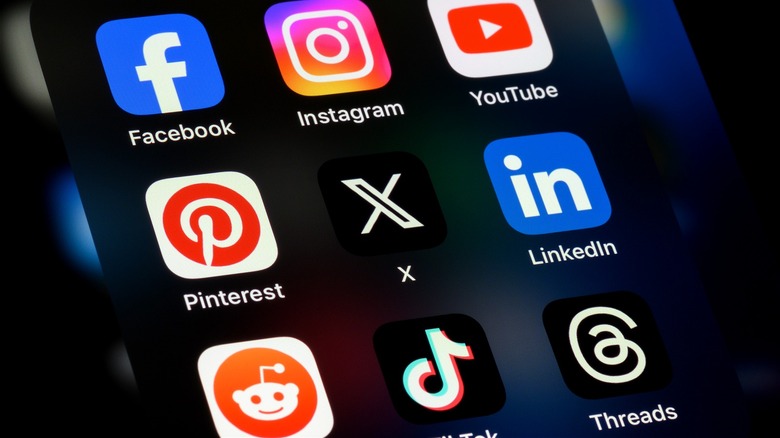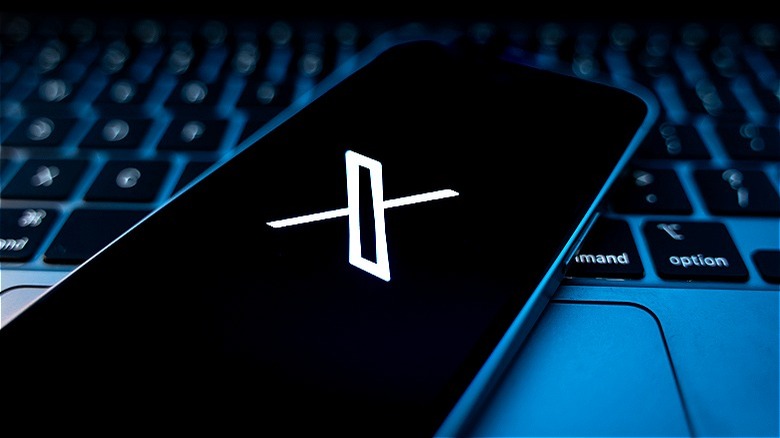The Real Reason Social Media Sites Are Turning To Subscriptions
Since the introduction of social media platforms, such as Myspace, Facebook, and Twitter, in the early 2000s, users have always been able to enjoy them at no cost. All one has to do is simply create an account, and they're ready to follow, post, and reshare to their heart's content. While free usership is still very much available, most social media sites are now offering subscriptions as well, which give access to features that used to be free.
For example, the social platform X, formerly called Twitter. Celebrities, brands, and other high-profile accounts on X were once automatically granted a blue verification check mark to help their followers know they're the real deal, not an imposter. Now, in order to secure a blue check, one must pay $7 a month for X Premium (formerly Twitter Blue), a requirement implemented after Elon Musk's acquisition of the platform in 2022.
And this phenomenon of asking social media users to pay for special perks isn't limited to X, with Meta, owner of Facebook (watch out for these telltale signs of Marketplace scams) and Instagram, as well as YouTube, Snapchat, Reddit, and more rolling out subscription plans of their own. But what's causing this payment shift? There are two overarching reasons why these platforms are turning to subscriptions: One, they provide an increase in revenue during a period of decline in traditional advertising, and, two, they aim to curb bot accounts.
Subscriptions bring in revenue for social media sites
Revenue from traditional advertising on social media platforms isn't what it used to be. In October 2022, Meta reported its revenue fell for the second quarter in a row, down 4% from $29.01 billion to $27.71 billion. As for X, which relies on ad sales for over 70% of its revenue, its numbers have plummeted from $5.1 billion in 2021 to approximately $2.5 billion in 2023.
At the end of the day, Meta and X are businesses that need to make a profit, which is where the strategy of user subscriptions comes into play (speaking of subscriptions, here's why using autopay could end up costing you). Users, especially business owners, who comprise more than 200 million accounts on Facebook alone, want, and need, their content to be seen by as many people as possible. Therefore, if success means paying a small monthly subscription fee to secure more visibility to target audiences, they may be inclined to sign up.
Meta, X, and other social media heavyweights understand this. As a result, they hide blue-check verifications, the ability to reach niche populations, and other helpful site features that might attract potential customers behind a paywall, leaving many businesses no choice but to subscribe. Yet, the jury is still out on whether or not X Premium and Meta Verified can supplement those tanking ad sales. When the former was rolled out, the first few months saw 180,000 — only 0.2% of monthly active users — sign up.
Adding subscriptions to decrease bots
Most social media sites have an influx of bots, which are pesky, fake accounts that troll, spread misinformation, and do other malicious activities. On X, for example, according to a 2020 study by Carnegie Mellon, out of 200 million posts about the COVID-19 pandemic that year, 82% of the top 50 retweeters were bots. As for Facebook, 3 billion bots were blocked over a six-month span in 2019.
Some social media platforms are testing out subscriptions as a means to curb the ever-increasing number of bots. For example, in October 2023, X owner Elon Musk rolled out a test-run plan in the Philippines and New Zealand that required new users to cough up $1 a year to access basic features. A post from X read (via Forbes), "This new test was developed to bolster our already successful efforts to reduce spam, manipulation of our platform and bot activity, while balancing platform accessibility with the small fee amount. It is not a profit driver."
With this said, experts are hesitant to believe in this endeavor's success. As tech industry analyst Charles King, of Pund-IT, told Forbes, "I doubt that nations trying to sow social and political discord, like impacting elections, and criminal groups that use bots for financial gain will be deterred. For them, an annual 'buck a bot' will be an affordable cost of doing business." (Check out our list of things that used to be free but now cost money.)


